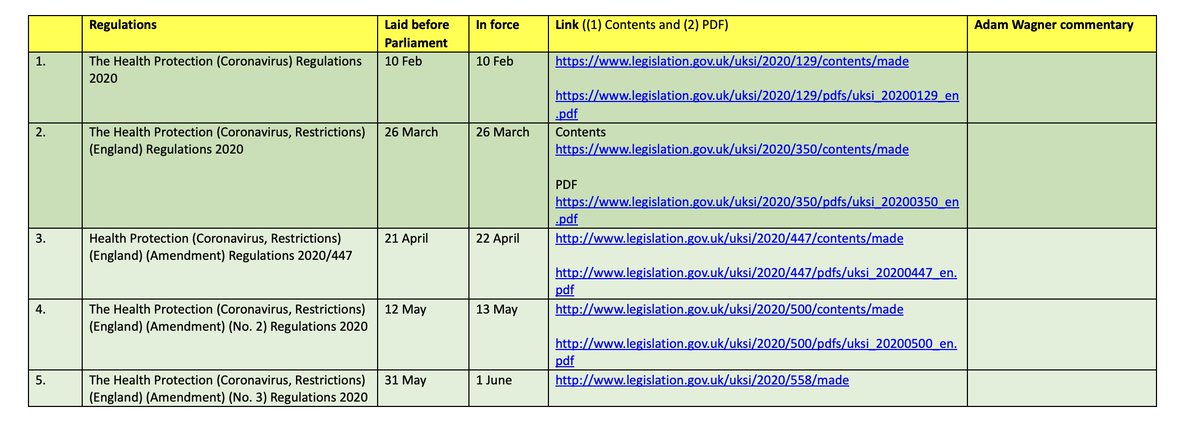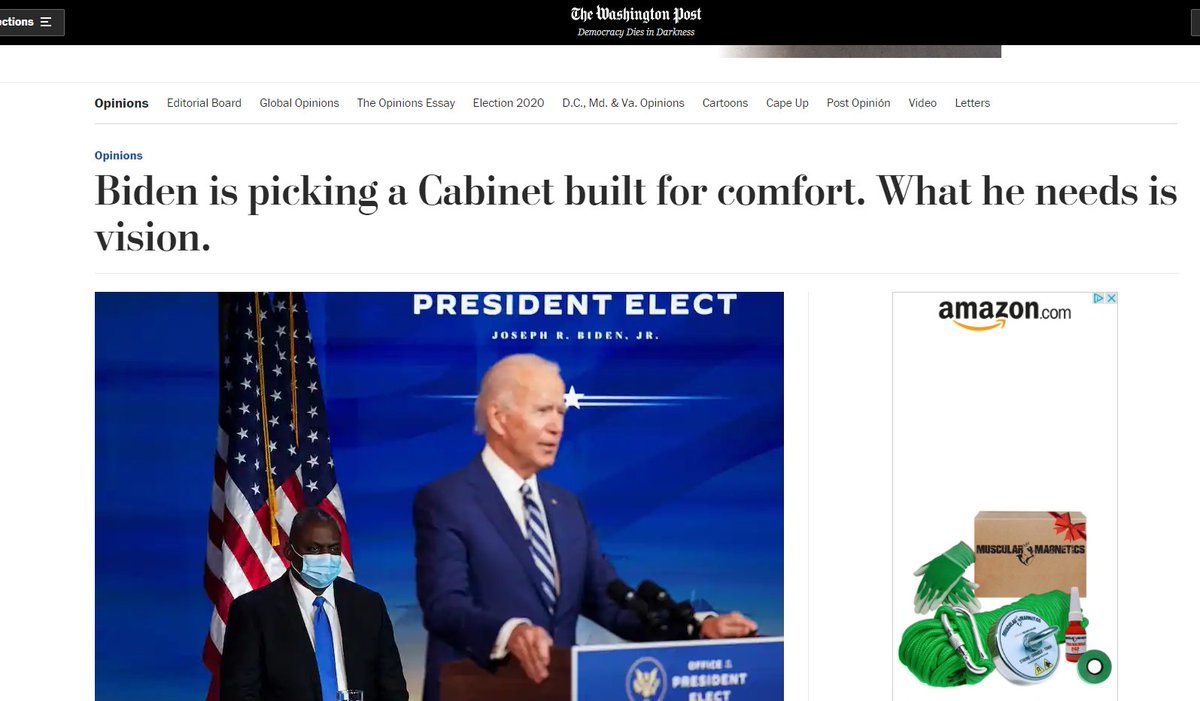Alex1Powell Categories Politics
7 days
30 days
All time
Recent
Popular
[thread]
Can I be the first to congratulate Boris Johnson
On getting a "British shaped deal"
On a "gold standard" trade deal
On making the UK "mightily prosper"
/joking
He won't
But he will sell it as such
And that is all that matters
Can I be the first to congratulate Boris Johnson
On getting a "British shaped deal"
On a "gold standard" trade deal
On making the UK "mightily prosper"
/joking
He won't
But he will sell it as such
And that is all that matters
British PM Boris Johnson will visit India in January to boost trade ties, his first major bilateral trip since taking office https://t.co/EjfCeYAaNK via @bpolitics
— Joe Mayes (@Joe_Mayes) December 15, 2020
We need to talk about UK politics. More specifically we need to talk about the absence of opposition to a no-deal Brexit risking Scottish independence, Northern Irish peace, the end of the mass market car industry, more expensive food, and damaged relations with US and EU 1/n
Project fear and the red wall. The first meaning that every serious threat, such as that of Nissan that their plant will be unsustainable, is dismissed with little discussion. The red wall, apparently so angry with Labour about the EU they are afraid to have a position. 2/
Because 'sovereignty' apparently. But a particularly nefarious form of sovereignty in which the normal kind of things you discuss in a Free Trade Agreement - shared rules, access to waters - become when discussed with the EU unacceptable infringements and threats. 3/
You note in the UK we aren't having a discussion on what level playing field rules or access to fishing waters might be acceptable. Or normal. Or even what we might want, like shared increased commitments on climate change. No, all rumours. Evil EU. Worse French. 4/
Those who follow closely see incredible briefings in the papers, like today claiming the EU demand for raising minimum shared standards was only raised on Thursday, treated as fact. This was known months ago. But the media too often just reports the spin as fact. 5/
UK cabinet to back Johnson over no-deal Brexit - The Times https://t.co/uCuOTsNdJL pic.twitter.com/88x5Tw2g53
— Reuters (@Reuters) December 6, 2020
Project fear and the red wall. The first meaning that every serious threat, such as that of Nissan that their plant will be unsustainable, is dismissed with little discussion. The red wall, apparently so angry with Labour about the EU they are afraid to have a position. 2/
Because 'sovereignty' apparently. But a particularly nefarious form of sovereignty in which the normal kind of things you discuss in a Free Trade Agreement - shared rules, access to waters - become when discussed with the EU unacceptable infringements and threats. 3/
You note in the UK we aren't having a discussion on what level playing field rules or access to fishing waters might be acceptable. Or normal. Or even what we might want, like shared increased commitments on climate change. No, all rumours. Evil EU. Worse French. 4/
Those who follow closely see incredible briefings in the papers, like today claiming the EU demand for raising minimum shared standards was only raised on Thursday, treated as fact. This was known months ago. But the media too often just reports the spin as fact. 5/
Post Leads #Q1941 +
https://t.co/tYAjFik5eX
https://t.co/eTPLicEgE5
Was 'Nazism' ever truly destroyed?
Was it merely a sub-division within a larger organization?
One finger attached to a hand?
Did ANTIFA organically form?
Flag design coincidence?
Socialist push in US/WW coincidence?
Global power struggle.
There is a price we will not pay.
There is a point beyond which they must not advance.
https://t.co/Vsp5J14P0P
https://t.co/LNSxx5VP0a
We, the PEOPLE.
#Q192
Why are China & Russia communist S/closed?
Can you find an owl / Y there?
Was this to prevent evil from entering?
Was this to protect their children/people?
Why was BO shamed during trip to China, SA, other locations?
How was POTUS hosted?
Compare.
Think.
Fantasy land.
Q
https://t.co/tYAjFik5eX
https://t.co/eTPLicEgE5
Was 'Nazism' ever truly destroyed?
Was it merely a sub-division within a larger organization?
One finger attached to a hand?
Did ANTIFA organically form?
Flag design coincidence?
Socialist push in US/WW coincidence?
Global power struggle.
There is a price we will not pay.
There is a point beyond which they must not advance.
https://t.co/Vsp5J14P0P
https://t.co/LNSxx5VP0a
We, the PEOPLE.
#Q192
Why are China & Russia communist S/closed?
Can you find an owl / Y there?
Was this to prevent evil from entering?
Was this to protect their children/people?
Why was BO shamed during trip to China, SA, other locations?
How was POTUS hosted?
Compare.
Think.
Fantasy land.
Q
TS 1246
Hillary and Soros had their own thread. This here is a list of others going down. Who are also legal disgraces and embarrassments to the USA
https://t.co/yLcbSi0GM7

Hillary and Soros had their own thread. This here is a list of others going down. Who are also legal disgraces and embarrassments to the USA
https://t.co/yLcbSi0GM7

\u201cWe\u2019ve not gotten any court to judge this (the vote) on its merit.\u201d @DanPatrick of Texas. It is a legal disgrace, an embarrassment to the USA!!!
— Donald J. Trump (@realDonaldTrump) December 12, 2020
One question I keep getting about the Georgia early voting is about age: isn't the electorate older, and how much does it hurt the Democrats?
So far the answer is 'not really' and 'not at all.'
The first question is easy enough. As of today, youth turnout is basically keeping pace with the general, controlling for the slightly reduced opportunities to vote. This augurs for an unusually young
The second question is more interesting: are the Democrats hurt by lower youth turnout? So far the answer is no, and there are two reasons.
One reason: there's not a *huge* gen. gap. Maybe young voters are D+20 while >65 are R+15. You need a big gap for modest changes to matter.
The second reason is maybe more interesting: the young voters who have voted are just a lot more Democratic than the young voters who turned out at this stage of the general election
By party primary vote history, the 18-29 year olds who have voted so far are D 38, R 12. They were D 33, R 14 in the general at this stage.
So far the answer is 'not really' and 'not at all.'
The first question is easy enough. As of today, youth turnout is basically keeping pace with the general, controlling for the slightly reduced opportunities to vote. This augurs for an unusually young
it's not a very material difference pic.twitter.com/ygdD3hb8b7
— Nate Cohn (@Nate_Cohn) December 29, 2020
The second question is more interesting: are the Democrats hurt by lower youth turnout? So far the answer is no, and there are two reasons.
One reason: there's not a *huge* gen. gap. Maybe young voters are D+20 while >65 are R+15. You need a big gap for modest changes to matter.
The second reason is maybe more interesting: the young voters who have voted are just a lot more Democratic than the young voters who turned out at this stage of the general election
By party primary vote history, the 18-29 year olds who have voted so far are D 38, R 12. They were D 33, R 14 in the general at this stage.
So today, QDay Dec 17 is actually November 3, Election Day on the Chinese Lunar calendar? The year of the RAT? #Nocoincidences
h/t @BenjaminPD23

Search RATS in the drops. Several hits. Here’s one:
Phase III
Traitors Justice.

What’s PHASE III?
one of 8 moon phases each month. Phase III for Dec 2020 appears to be Dec 21, winter solstice.

Phase III shows Dark to Light. Look at it! Half Dark half Light looking straight on.
for Dec 2020 it also falls on Winter Solstice 12/21. Another Dark to Light Day. Shortest day of the Year with least amount of daylight.

https://t.co/F8hYtfr8Al
h/t @BenjaminPD23

Search RATS in the drops. Several hits. Here’s one:
Phase III
Traitors Justice.

What’s PHASE III?
one of 8 moon phases each month. Phase III for Dec 2020 appears to be Dec 21, winter solstice.

Phase III shows Dark to Light. Look at it! Half Dark half Light looking straight on.
for Dec 2020 it also falls on Winter Solstice 12/21. Another Dark to Light Day. Shortest day of the Year with least amount of daylight.

https://t.co/F8hYtfr8Al
2/ 12/21 winter solstice is a DARK to LIGHT day. The shortest day of the year, when days start getting longer, with more minutes of sunlight. Also? In 2020 that day we will see a CHRISTMAS \u2b50\ufe0f , first time in 800 years! https://t.co/kcTV6dgs9d
— #ReleaseTheKRAKEN BrunoBarking (@Bruno062418) December 13, 2020
A year ago, the idea that you could close every restaurant, café and pub in the capital without a Parliamentary vote or even a debate would have been unthinkable. Today we have allowed government by executive decree and it now seems normal. Covid lawmaking has corroded democracy
To explain: since March, the government has used the Public Health (Control of Diseases) Act 1984 to pass lockdown laws - over 60 (I have listed them here https://t.co/5Z1p3gVjbX).

The lockdown laws have imposed stringent restrictions on movement, freedom of association, family life, religion etc. But each and every lockdown law passed has used the super emergency procedure which allows the government to pass them without a parliamentary vote for 28 days
The government did this for months before MPs revolted at which point it promised to put any major changes before parliament first. It has done this since the three tiers in mid-October.
BUT...
(1) The govt is still only giving parliament about 12 hours to consider laws and the vote is a simple yes or no
(2) Changes to tiered areas are not considered major changes so these don't go to a vote until 28 days later by which time it has usually changed.
To explain: since March, the government has used the Public Health (Control of Diseases) Act 1984 to pass lockdown laws - over 60 (I have listed them here https://t.co/5Z1p3gVjbX).

The lockdown laws have imposed stringent restrictions on movement, freedom of association, family life, religion etc. But each and every lockdown law passed has used the super emergency procedure which allows the government to pass them without a parliamentary vote for 28 days
The government did this for months before MPs revolted at which point it promised to put any major changes before parliament first. It has done this since the three tiers in mid-October.
BUT...
(1) The govt is still only giving parliament about 12 hours to consider laws and the vote is a simple yes or no
(2) Changes to tiered areas are not considered major changes so these don't go to a vote until 28 days later by which time it has usually changed.




























